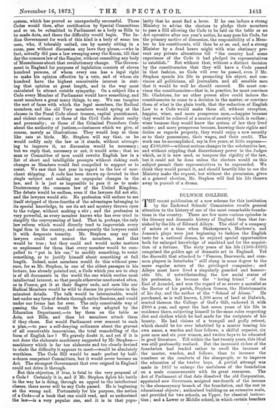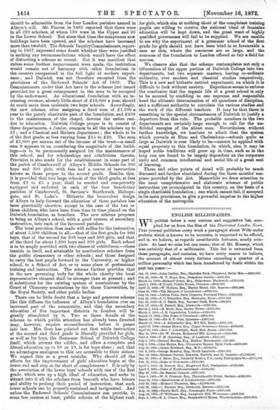DULWICH COLLEGE.
THE recent publication of a new scheme for this institution by the Endowed Schools' Commission recalls general attention to the history of one of the most remarkable founda- tions in the country. There are few more curious episodes in the literary and dramatic history of England than that fur- nished by the life of Edward Alleyn. The chief of a company of actors at a time when Shakespeare's, Marlowe's, and Jonson's plays were just beginning to fashion the English taste for a national drama, he enjoyed special opportunities both for enlarged knowledge 'of mankind and for the acquisi- tion of a fortune. The sixty years of his life (1566-1626) comprised the golden age of dramatic art in England. Yet the discredit that attached to "Fencers, Bearwards, and com- mon players in Interludes" still clung in some degree to the more regular actors of the privileged companies ; and Alleyn must have lived a singularly guarded and honour- able life, if notwithstanding the low social status of his profession, he became the "loving friend" of the Earl of Arundel, and won the regard of so severe a moralist as the Rector of his parish, Stephen Gosson, the Histriomastix of his day, and the author of the "School of Abuse." He purchased, as is well known, 1,300 acres of land at Dulwich, erected thereon the College of God's Gift, endowed it with £800 a year, and spent the last seven years of his life in residence there, subjecting himself to the same rules respecting diet and clothes which he had made for the recipients of his bounty. He had visions of a tranquil and godly retreat, which should be for ever inhabited by a master bearing his own name, a warden and four fellows, a skilful organist, six poor men and six poor women, and twelve boys to be educated in good literature. Till within the last twenty years, this ideal was still professedly realised. But the increased riches of the foundation had tended rather to swell the incomes of the master, warden, and fellows, than to increase the numbers or the comforts of the almspeople, or to improve the education of the twelve boys. A partial attempt was made in 1857 to enlarge the usefulness of the foundation on a scale commensurate with its great resources. The Act of Parliament of that date dissolved the old Corporation, appointed new Governors, assigned one-fourth of the income to the eleemosynary branch of the foundation, and the rest to educational objects ; authorised building on an extensive scale, and provided for two schools, an Upper, for classical instruc- tion; and a Lower or Middle school, in which certain boarders
should be admissible from the four London parishes named in Alleyn's will. Mr. Pearon in 1865 reported that there were in all 220 scholars, of whom 130 were in the Upper and 90 in the Lower School. But since that time the sumptuous new buildings have been opened, and the scholars have increased more than twofold. The Schools' InquiryCommissioners, report- ing in 1867, expressed some doubt whether they were justified in making any recommendations which would have the effect of disturbing a scheme so recent. But it was manifest that unless some farther improvement were made, the institution would remain out of harmony with other foundations in the country reorganised in the full light of modern experi- ence; and Dulwich was not therefore excepted from the provisions of the Endowed Schools' Act of 1869. The Commissioners under that Act have in the scheme just issued provided for a great enlargement in the area to be occupied by the endowment. An educational foundation with an in- creasing revenue, already little short of £18,000 a year, should do much more than maintain two boys' schools. Accordingly, the new scheme, after assigning a fixed sum of £1,500 a year to the purely charitable part of the foundation, and £450 to the maintenance of the chapel, devotes the entire resi- due to education. Dulwich College proper is to consist of three departments, a Junior, common to all the scholars up to 13; and a Classical and Modern department ; the whole to be of the first grade, at fees varying from £15 to £20. The sum of £1,800 per annum out of the income of the trust-a small sum it appears to us, considering the magnitude of the build- ings-is to be permanently assigned for the maintenance of this school, and for scholarships and exhibitions therein. Provision is also made for the establishment in some part of the parish of Camberwell of Alleyn's Middle Schools for 300 boys and 300 girls, with fees and a course of instruction known as those proper to the second grade. Besides this, it is provided that two large schools of the third grade, at fees from £2 to £5 a year, shall be erected and competently equipped and endowed in each of the four beneficiary parishes of Camberwell, St. Saviour's Southwark, Bishops- gate, and St. Luke's. Hitherto the benevolent design of Alleyn to help forward the education of those parishes has been practically abortive, except in the case of the two or three children who have been from time to time placed on the Dulwich foundation as boarders. The new scheme proposes to bring an Alleyn's school, with a good system of secondary instruction, into each of the favoured parishes.
The total provision thus made will suffice for the instruction of about 3,500 children in all,-that of the first grade for 900 boys, that of the second for 300 boys and 300 girls, and that of the third for about 1,200 boys and 800 girls. Each school is to be amply provided with two classes of exhibitions,-those tenable in itself, and attainable by meritorious scholars from the public elementary or other schools ; and those designed to carry the best pupils forward to the University, or higher school, to a School of Art, or to some place of professional training and instruction. The scheme farther provides that in the new governing body for the whole charity the local representative element shall be stronger than at present ; and it substitutes for the existing system of nominations by the Court of Chancery nominations by the three Universities, by the Royal Society, and other public bodies.
There can be little doubt that a large and generous scheme like this diffuses the influence of Alleyn's foundation over an increased part of the community, and that the secondary education of five important districts in London will be greatly stimulated by it. Two or three details of the scheme to which public attention has already been directed may, however, require reconsideration before it passes into law. Mrs. Grey has pointed out that while instruction of the second and third grade is liberally provided for girls, as well as for boys, the Grammar School of Dulwich College itself, which crowns the edifice, and offers a complete and liberal education up to 18 or 19, is for boys alone ; and that no advantages analogous to this are accessible to their sisters. We regard this as a great mistake. Why should all the efforts for the improvement of girls' education begin at the lower end and stop so far short of completeness? It is only by the association of the lower boys' schools with one of the first grade, which sets up a high ideal of education, and seeks to attract into it all the scholars from beneath who have leisure and ability to prolong their period of instruction, that such lower schools can be properly sustained and invigorated. And unless the Endowed Schools' Commissioners can provide, in some few centres at least, public schools of the highest rank
for girls, which aim at nothing short of the completast training pupils are willing to receive, the national ideal of feminine education will be kept down, and the great want of highly qualified governesses will fail to be supplied. We are unable to see why the experiment of a grammar school of the first grade for girls should not have been tried in so favourable a case as this, where the resources are so large, and the nearness of the foundation to London offered so fair a field for success.
We observe also that the scheme contemplates not only a bifurcation of the upper portion of Dulwich College into two departments, but two separate masters, having co-ordinate authority, over modern and classical studies respectively, This is a new and hitherto untried experiment, on which it is difficult to look without anxiety. Experience seems to enforce the conclusion that the organic life of a great school is only to be secured by confiding to one supreme and responsible head the ultimate determination of all questions of discipline, and a sufficient authority to correlate the various studies and the work of the different teachers. It may be that there is something in the special circumstances of Dulwich to justify a departure from this rule. The probable numbers in the two departments are certainly large enough to call for the un- divided energies of the ablest men. Nevertheless, without further knowledge, we hesitate to admit that the system which prevails at Eton and Cheltenham-schools quite as large as Dulwich is ever likely to be-cannot be applied with equal propriety to this foundation, in which, also, it may be hoped noble traditions will grow up in time, such as in the long run are found to be largely dependent on the corporate unity and common intellectual and social life of a great seat of learning.
These and other points of detail will probably be much discussed and further elucidated during the three months' sus- pense provided by the Act. Meanwhile we draw attention to the most comprehensive and elaborate scheme of public instruction yet promulgated in this country, on the basis of a single charitable foundation ; one which cannot fail, if accepted in its main provisions, to give a powerful impetus to the higher education of the metropolis.



































 Previous page
Previous page